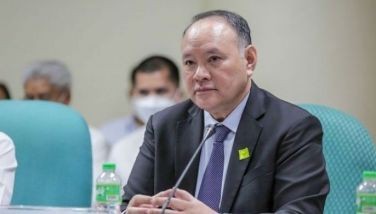Makati siege a body blow to economy — Analysts
July 28, 2003 | 12:00am
The coup attempt has set the Philippines back one and a half years, Philippine Stock Exchange chairwoman Alicia Arroyo said yesterday.
"We at the Exchange condemn this act as this has set our country back for one and a half years and damaged the image of our country despite the hard work of our government and the military," Arroyo said.
She said those who plotted the coup are "pulling us down" but blame President Arroyo for the consequences of their action.
"It is very transparent that they have been misguided by politicians with their own agenda to destabilize. Let us pray for their enlightenment," Arroyo said.
Analysts and business leaders, for their part, warned it would drive away investors and leave the country’s near-term economic prospects in tatters.
The takeover of the Makati financial district by rebel soldiers is the eighth military uprising here in 17 years.
So far there has been no bloodshed but there are fears it could follow the script of a 1989 coup attempt when another band of rebels turned the district of high-rise luxury hotels, condominiums and shopping malls into a bloody battleground for a week.
"Even now, the business sector is in a state of shock," Trade Secretary Manuel Roxas II said. "We must remember the 1989 coup that brought down our economy to nearly zero growth – it took us several years before our economy began to recover."
After the release of about 300 residents, including the Australian ambassador who was trapped inside the booby-trapped buildings overnight, Mrs. Arroyo declared a "state of rebellion" and gave the mutineers until last night to surrender or face attack.
Asian neighbors such as Thailand and South Korea also went through a period of military rebellions before discovering democracy that transformed their economies, Manila-based political analyst Alex Magno of the Foundation for Economic Freedom told AFP.
"We thought we had also gotten over this phase," Magno said. "But this is different."
While the repeated coups in Manila in the late 1980s sought to change the direction of national government policies, "this is a devalued rebellion used to leverage for increased combat pay," he said.
Mrs. Arroyo met with a group of junior military officers last week and pledged to address their concerns over low pay, inadequate housing, and alleged corruption by top brass.
Still, to put the genie back in the bottle, the government has to "put in enough disincentives for this activity," Magno said, suggesting harsher penalties for mutiny, better pay, and education.
For the time being, the Philippines is left counting the cost.
"The military aspect of it we can handle," Defense Secretary Angelo Reyes said. But "the longer it takes, the more damage to the economy" is expected.
The Philippines was rocked by an unprecedented series of military rebellions in the late 1980s. The government thought it had solved the problem when it signed a peace treaty and amnestied the coup leaders in 1993.
Roxas said government efforts to create jobs "will become meaningless if we cannot hold our society together.
"Investors locating in the Philippines would want to make sure that peace and order are in place. We should realize that these incidents have long term effects in our economy and society," he said. — Zinnia de la Peña, AFP
"We at the Exchange condemn this act as this has set our country back for one and a half years and damaged the image of our country despite the hard work of our government and the military," Arroyo said.
She said those who plotted the coup are "pulling us down" but blame President Arroyo for the consequences of their action.
"It is very transparent that they have been misguided by politicians with their own agenda to destabilize. Let us pray for their enlightenment," Arroyo said.
Analysts and business leaders, for their part, warned it would drive away investors and leave the country’s near-term economic prospects in tatters.
The takeover of the Makati financial district by rebel soldiers is the eighth military uprising here in 17 years.
So far there has been no bloodshed but there are fears it could follow the script of a 1989 coup attempt when another band of rebels turned the district of high-rise luxury hotels, condominiums and shopping malls into a bloody battleground for a week.
"Even now, the business sector is in a state of shock," Trade Secretary Manuel Roxas II said. "We must remember the 1989 coup that brought down our economy to nearly zero growth – it took us several years before our economy began to recover."
After the release of about 300 residents, including the Australian ambassador who was trapped inside the booby-trapped buildings overnight, Mrs. Arroyo declared a "state of rebellion" and gave the mutineers until last night to surrender or face attack.
Asian neighbors such as Thailand and South Korea also went through a period of military rebellions before discovering democracy that transformed their economies, Manila-based political analyst Alex Magno of the Foundation for Economic Freedom told AFP.
"We thought we had also gotten over this phase," Magno said. "But this is different."
While the repeated coups in Manila in the late 1980s sought to change the direction of national government policies, "this is a devalued rebellion used to leverage for increased combat pay," he said.
Mrs. Arroyo met with a group of junior military officers last week and pledged to address their concerns over low pay, inadequate housing, and alleged corruption by top brass.
Still, to put the genie back in the bottle, the government has to "put in enough disincentives for this activity," Magno said, suggesting harsher penalties for mutiny, better pay, and education.
For the time being, the Philippines is left counting the cost.
"The military aspect of it we can handle," Defense Secretary Angelo Reyes said. But "the longer it takes, the more damage to the economy" is expected.
The Philippines was rocked by an unprecedented series of military rebellions in the late 1980s. The government thought it had solved the problem when it signed a peace treaty and amnestied the coup leaders in 1993.
Roxas said government efforts to create jobs "will become meaningless if we cannot hold our society together.
"Investors locating in the Philippines would want to make sure that peace and order are in place. We should realize that these incidents have long term effects in our economy and society," he said. — Zinnia de la Peña, AFP
BrandSpace Articles
<
>
- Latest
- Trending
Trending
Latest
Trending
Latest
Recommended






























